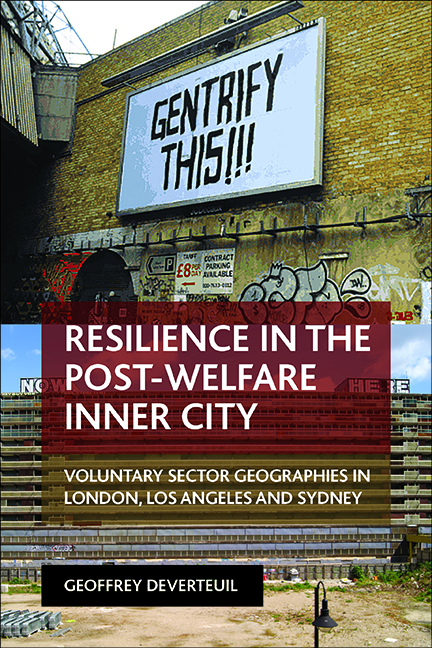 Resilience in the Post-Welfare Inner City
Resilience in the Post-Welfare Inner City Book contents
- Frontmatter
- Dedication
- Contents
- List of tables and figures
- About the author
- Acknowledgements
- Preface
- Part One Introducing resilience in the post-welfare inner city: conceptual and methodological considerations
- Part Two Case studies: spatial and social resilience in London, Los Angeles and Sydney
- Part Three Conclusions, critical resilience, commons and austerity
- References
- Index
Part One - Introducing resilience in the post-welfare inner city: conceptual and methodological considerations
Published online by Cambridge University Press: 10 March 2022
- Frontmatter
- Dedication
- Contents
- List of tables and figures
- About the author
- Acknowledgements
- Preface
- Part One Introducing resilience in the post-welfare inner city: conceptual and methodological considerations
- Part Two Case studies: spatial and social resilience in London, Los Angeles and Sydney
- Part Three Conclusions, critical resilience, commons and austerity
- References
- Index
Summary
Cities nowadays are increasingly characterised by spatial splintering and polycentrism, as well as an apparently ascendant neoliberalism (MacLeod, 2011). Yet even in places as complex as London, Los Angeles and Sydney, there remains a remarkably coherent and centralised landscape of voluntary-sector organisations, a conspicuous clustering of helping agencies for downtrodden and vulnerable people. The persistence and supportiveness of service-rich inner-city areas such as Westminster, Hollywood, Downtown Skid Row, Kings Cross and Surry Hills counter the logics that assume the neoliberalised dismantlement of residual Keynesian arrangements, notably large-scale social housing (Hackworth, 2007), the displacement of homeless people through gentrification and punitive street clearances, and a more radical break between the Keynesian welfare city and the putative post-welfare city (DeVerteuil et al, 2009a). The main aim of the book is to investigate and interpret this ‘how’ of resilient service-rich inner-city areas (deemed service hubs), their local particularities, and crosscutting differences and similarities individually and comparatively through the specific lens of the voluntary sector and within a context of a consolidating but decidedly incomplete neoliberalism via the lens of gentrification. The results suggested a wide range of resilience strategies in the three global city-regions, with London generally proving more state supported than Los Angeles’ more private and community-based strategies, and Sydney more in the middle of these extremes.
Part One introduces and explains the key concepts, gaps, contexts and methods, and grounds the resilience inherent in forthcoming case studies, the actual means of resilience, the agents of resilience, the consequences of such resilience, and how these may differ empirically and comparatively. Given the synthetic breadth of the proposed study – three global city-regions, 10 inner-city neighbourhoods, multiple and polysemous conceptual stances – this section is necessarily wide ranging. The title of the book plays on the tension between the practice of resilience and the promise of post-welfarism, and in particular how some residual arrangements prove resilient within a hostile yet incomplete and uneven post-welfare environment. Chapter One introduces the five cornerstones of the book: neoliberalism and the post-welfare city as the context; resilience as the conceptual framework; the voluntary sector as the agent; the inner city as the territorial focus; and comparison as the methodology. Chapters Two, Three And Four serve to elaborate on these cornerstones, but also contextualise the empirical material in Part Two and the analysis in Part Three.
- Type
- Chapter
- Information
- Resilience in the Post-Welfare Inner CityVoluntary Sector Geographies in London, Los Angeles and Sydney, pp. 1 - 2Publisher: Bristol University PressPrint publication year: 2015


